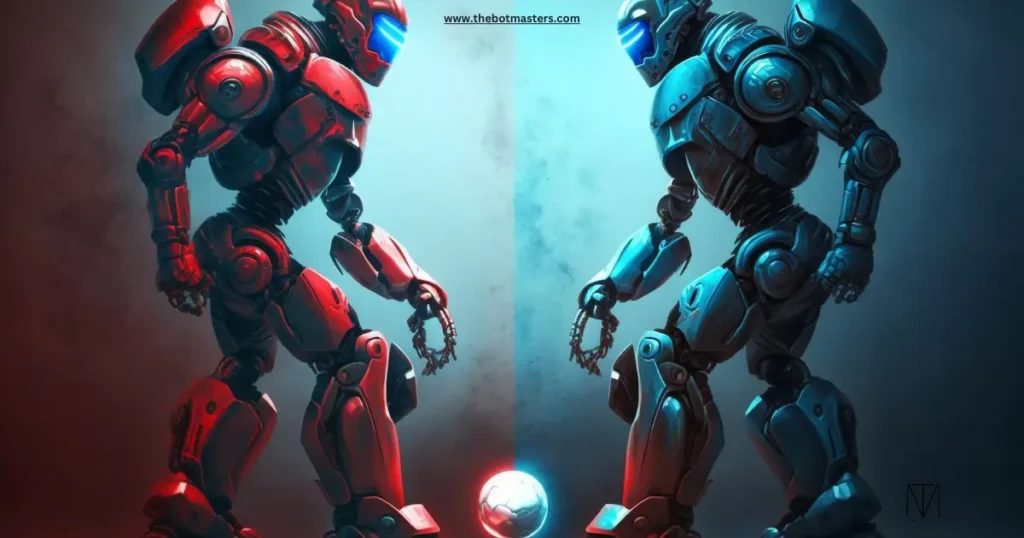In today’s fast-paced digital age, the entertainment industry has undergone a dramatic transformation, thanks to the infusion of Artificial Intelligence (AI) into various facets of entertainment. From movies and music to video games and virtual reality, AI is rapidly becoming the driving force behind innovative and captivating experiences for audiences worldwide. In this blog post, we’ll explore how AI is revolutionizing the future of showbiz, making entertainment more immersive, personalized, and technologically advanced than ever before

The Rise of AI in Entertainment
AI in Movies
The world of filmmaking has seen a significant evolution with the integration of AI. One of the most noticeable impacts is in the realm of special effects. AI-driven Computer-Generated Imagery (CGI) has redefined what’s possible in terms of visual storytelling. From breathtakingly realistic environments to awe-inspiring creatures, AI has elevated the quality of visual effects in movies.
But AI’s role in the film industry goes beyond just visuals. AI algorithms are now used to analyze scripts, predict box office success, and optimize marketing campaigns. This data-driven approach helps studios make informed decisions, ensuring that movies reach the right audience and generate the desired impact.
AI in Music
The music industry has not been left behind in the AI revolution. Musicians and composers can now harness the power of AI to assist in music composition. AI tools can generate melodies, harmonies, and even entire songs, providing artists with creative inspiration and speeding up the creative process.
Moreover, streaming platforms like Spotify and Apple Music employ AI to curate playlists based on users’ listening history and preferences. This personalized approach ensures that listeners discover new music that aligns with their tastes, creating a more engaging and enjoyable music experience.
AI in Video Games
Video games have always been at the forefront of technology, and AI has played a crucial role in pushing the boundaries of interactive entertainment. AI-driven Non-Playable Characters (NPCs) are now capable of adapting to a player’s actions, making gaming experiences more immersive and challenging. These NPCs can learn and evolve, responding intelligently to the choices players make within the game.
Another significant application of AI in the gaming industry is procedural content generation. Game developers use AI algorithms to create game content such as maps, levels, and even quests. This not only reduces development time but also ensures that games offer endless variations, keeping players engaged for longer.
AI in Virtual Reality (VR)
Virtual Reality (VR) has gained popularity as a medium that offers immersive experiences, and AI has amplified this trend. AI is responsible for rendering realistic VR environments, making users feel like they’ve stepped into another world. From exploring ancient civilizations to walking on distant planets, AI-powered VR offers endless possibilities.
In addition to realistic environments, AI plays a crucial role in creating interactive VR experiences. Virtual tour guides powered by AI can provide informative commentary, enhancing educational and exploratory VR journeys. Moreover, AI-driven storytelling adapts narratives in real-time based on user interactions, making VR adventures dynamic and responsive to individual choices.

Exploring All the Details
To gain a deeper understanding of the impact of AI in entertainment, let’s explore each facet in more detail:
1. AI in Movies
Special Effects: AI-generated special effects have transformed the visual landscape of movies. Whether it’s creating mythical creatures or simulating epic battles, AI-driven CGI sets new standards for realism and creativity. This innovation not only captivates audiences but also reduces production costs compared to traditional methods.
Script Analysis: AI algorithms analyze scripts to predict their potential success at the box office. By analyzing elements like story structure, character development, and genre, AI can provide valuable insights that guide filmmakers in making informed decisions about their projects.
Marketing Optimization: AI optimizes marketing strategies by identifying target audiences more accurately. It can analyze consumer behavior, preferences, and social media trends to ensure that promotional efforts are directed towards those most likely to engage with the content.
2. AI in Music
Composition Assistance: Musicians and composers can use AI tools to generate melodies, harmonies, and chord progressions. This not only expedites the creative process but also introduces new musical ideas that may not have been explored otherwise. AI-generated music can serve as a foundation for artists to build upon.
Personalized Playlists: Streaming platforms like Spotify use AI to curate playlists tailored to users’ tastes. By analyzing listening habits and user-generated playlists, AI can recommend songs and artists that align with individual preferences. This personalization enhances the overall music discovery experience.

3. AI in Video Games
Dynamic NPCs: AI-driven NPCs are no longer static characters in games. They adapt to players’ choices and actions, creating dynamic and challenging gameplay experiences. Whether it’s an enemy that learns from the player’s tactics or an ally that offers strategic advice, AI-driven NPCs add depth and immersion to video games.
Procedural Content Generation: AI-generated content has become a game-changer for developers. Instead of manually designing every level or map, AI algorithms can generate content procedurally. This not only saves time but also ensures that players encounter fresh challenges and environments with each playthrough.
4. AI in Virtual Reality (VR)
Realistic Environments: AI enhances VR experiences by rendering lifelike environments. Whether users are exploring a historic city or a fantastical realm, AI ensures that the virtual world feels convincing and immersive. The level of detail and realism AI brings to VR is truly astonishing.
Virtual Tour Guides: AI-powered guides lead users through virtual tours, providing informative commentary and enhancing the educational and entertainment value of VR experiences. Users can interact with these guides, ask questions, and receive personalized information based on their interests.
AI-Driven Storytelling: AI adjusts narratives in real-time based on user interactions. This means that in VR storytelling, the story can take unexpected turns depending on the choices users make. This interactivity makes VR adventures feel more like real-life adventures.
Conclusion
In conclusion, AI is not just a technological marvel; it’s a creative powerhouse that is reshaping the entertainment industry. From its profound impact on movies, music, and video games to its role in crafting immersive VR experiences, AI is making entertainment more engaging and personalized than ever before.
As technology continues to evolve, we can only imagine what the future holds for AI in entertainment. Perhaps we’ll see AI-generated movie scripts, music that connects with our emotions on a deeper level, video games that respond to our every move, and VR experiences that blur the line between reality and fiction.

F&Qs
AI in Entertainment refers to the integration of Artificial Intelligence (AI) technologies and algorithms into various aspects of the entertainment industry, including movies, music, video games, and virtual reality. It encompasses AI’s role in enhancing creativity, personalizing content, improving realism, increasing interactivity, and streamlining production processes within the entertainment sector.
AI has a significant impact on the movie industry by revolutionizing special effects, analyzing scripts for success prediction, and optimizing marketing strategies. AI-driven CGI creates stunning visual effects, while AI algorithms assist in script analysis and data-driven marketing decisions, leading to more engaging and successful films.
AI aids musicians and composers by assisting in music composition. AI tools can generate melodies, harmonies, and even entire songs, providing creative inspiration and expediting the music creation process. Additionally, streaming platforms use AI to curate personalized playlists based on user preferences.
AI enhances video games by creating dynamic Non-Playable Characters (NPCs) that adapt to players’ actions, making gameplay more immersive and challenging. AI is also used for procedural content generation, generating game content such as maps and levels, ensuring endless variations and longer player engagement.
AI has a profound impact on virtual reality by rendering realistic environments, making VR experiences more immersive. Virtual tour guides powered by AI provide informative commentary, enhancing educational and exploratory VR journeys. AI-driven storytelling adjusts narratives in real-time based on user interactions, making VR adventures dynamic and responsive.
AI contributes to creativity in entertainment by assisting artists and creators with generating new ideas and content. In music, AI can help composers find unique melodies, while in movies, it can suggest creative elements for scripts. AI’s ability to analyze data and generate innovative solutions sparks creativity in various entertainment domains.
Certainly! Examples of AI-driven innovations in entertainment include:
- AI-generated special effects in movies, creating lifelike visuals.
- Personalized music playlists on streaming platforms based on user preferences.
- Dynamic and adaptive NPCs in video games that respond to player actions.
- Procedural content generation in games, ensuring unique experiences.
- Realistic VR environments and interactive storytelling in virtual reality experiences.
The future of AI in entertainment holds the promise of even more advanced and immersive experiences. We can expect to see AI-generated movie scripts, highly personalized content across all entertainment mediums, and AI-driven innovations that continue to push the boundaries of creativity and interactivity.
AI is not replacing human creativity but rather enhancing it. AI tools and algorithms serve as creative aids, assisting artists and creators in generating content more efficiently and exploring new creative avenues. Human creativity remains at the core of entertainment, while AI acts as a valuable tool for amplifying creative potential.
To stay updated on the latest developments in AI and entertainment, you can follow industry news websites, subscribe to relevant blogs, and engage with social media accounts of companies and experts in the field. Additionally, attending conferences and webinars focused on AI in entertainment can provide valuable insights into emerging trends and technologies.
Read More…
AI Tools in Finance: Revolutionizing the Financial World
AI Language Translation Devices for Travelers
AI Tools in Education: Transforming the Future of Learning
Supercharge Your Productivity with AI Gadgets
AI Tools for Marketers: Revolutionizing the Way You Reach Your Audience
AI in Healthcare: 7 Key Innovations Transforming Medicine
AI Tools for Businesses: Enhancing Efficiency and Growth
The Future of Technology: Exploring Wearable AI Tech
Exploring the World of Smart Home Devices: A Comprehensive Guide
An Introduction to AI Tools: Unlocking the Power of Artificial Intelligence
How to Guide for Important AI Tools
“Discover AI Tools on Amazon”
If you’re interested in exploring AI Translation devices, you can find a wide range of options on Amazon. From smart devices to data analytics software, Amazon offers a selection of AI solutions that can help your business thrive. Explore AI tools on Amazon today to stay ahead in the digital age.
Please note that if you decide to make a purchase through this link, I may earn a small commission at no additional cost to you.
“Thank you for your support!”
